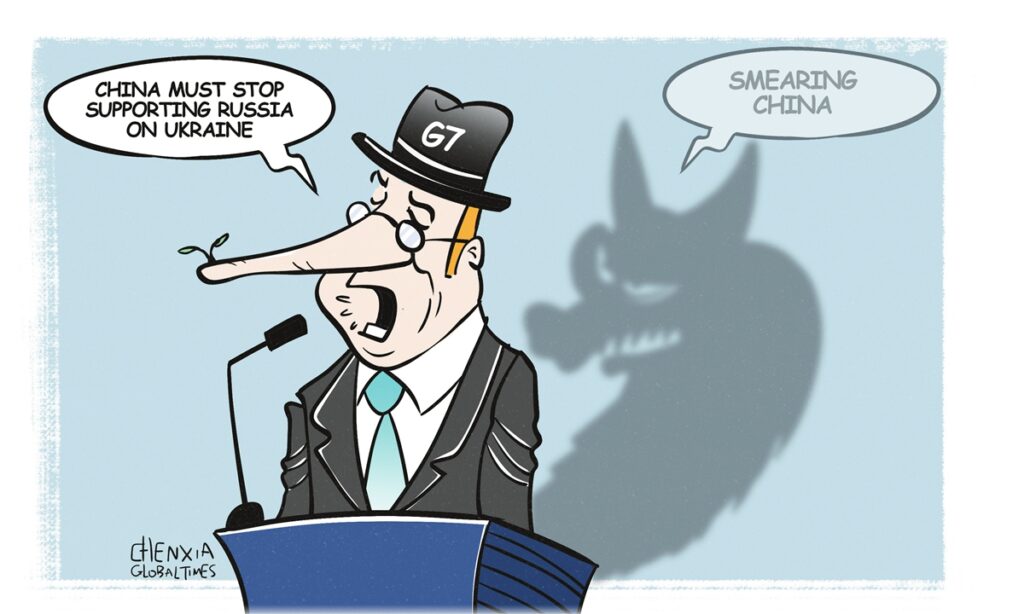The G7, originally an economic organization focused on economic cooperation, frequently involves itself in international events and conflicts beyond its original scope. In particular, it has inserted itself into the Russia-Ukraine conflict, becoming a meddlesome force with clear political motives.
According to an early draft from the G7 Foreign Ministers’ meeting reported by Bloomberg on Monday, they are expected to vow “‘appropriate measures consistent with our legal systems, against actors in China and in other third countries’ who are supporting Russia’s ‘war machine’ in Ukraine.”
Why is the G7 so intent on portraying China as aiding Russia militarily? On the one hand, they want to pass the buck to China for the Russia-Ukraine conflict. On the other, they are trying to legitimize their strategy of isolating China and uniting a small circle of allies led by the US, from calling on China to stop its “backing” of Russia’s dual-use weapons in April to now attempting to take “appropriate measures.”
The Chinese Ministry of Foreign Affairs has repeatedly responded that “China handles the export of military products prudently and responsibly. We have never provided lethal weapons to any party of the conflict.” It has also pointed out multiple times that China’s normal trade with Russia is done aboveboard. It’s consistent with WTO rules and market principles. It does not target any third party and should not come under external interference or coercion. China’s legitimate and lawful rights and interests brook no infringement.
However, it is the US, the G7’s “main leader,” who has authorized Ukraine to use powerful long-range weapons to strike targets.
Regardless of the fact, the Russia-Ukraine conflict provides the G7 an opportunity to amplify the so-called “China threat” narrative. They use it as an excuse to expand sanctions against Russia and other countries, and weaken China’s international image, thereby consolidating G7’s waning influence.
The G7 is no longer regarded as a purely economic organization but rather a geopolitical alliance, a tool for advancing “strategic objectives.” Their true aim has shifted to using pressure and sanctions to promote the strategic interests of specific nations, shaping the global order and maintaining Western dominance. As a result, China has become their primary target.
The G7 expresses frequent concerns about China possibly supporting Russia, yet chooses to turn a blind eye to the US’ approval of Ukraine’s use of long-range weapons. One side calls for peace while the other fuels the flames of war – who should be questioned? This reveals that Western politicians, eager to threaten Beijing with sanctions, are simply making futile, baseless statements, which only harm the West’s overall image.
Not only the G7, but the European Commission is also proposing sanctions related to the Russia-Ukraine conflict. According to documents leaked to Bloomberg, the European Commission will sanction several Chinese firms it claims helped Russian companies develop attack drones that were deployed against Ukraine. Companies from Russia, Serbia, Iran, India, and other countries will also be included in the sanctions.
Such “scattershot” actions prove that neither the G7 nor the EU are genuinely focused on ending the Russia-Ukraine conflict. The G7 constantly talks about its “unwavering commitment” to Kiev, yet never stops its “unwavering smearing” against China. What the G7 expresses is a self-affirmation of its perceptions, reinforcing its narrow mind-set rather than presenting a true solution to the Russia-Ukraine conflict. “By taking such an extreme stance, the G7 risks becoming increasingly isolated and awkward on the global diplomatic stage,” Li Haidong, a professor at China Foreign Affairs University, told the Global Times.
GT



